A region of the hippocampus appears to be uniquely activated during functional magnetic resonance imaging (MRI) among individuals who later go on to develop psychosis.
Using cerebral blood volume mapping, the region—known as the CA1 subfield of the hippocampus—was found to be hyperactive among those individuals who were at high risk of psychosis and who later developed a first-episode psychotic disorder. Moreover, hyperactivity in the CA1 subfield also tracked positively with increasing severity of delusional symptoms and with avolition and social withdrawal—two “negative” symptoms associated with worsening outcome.
The report appeared in the September Archives of General Psychiatry. The lead author is Scott Small, M.D., the Herbert Irving Associate Professor of Neurology in the Sergievsky Center and in the Taub Institute for Research on Alzheimer's Disease and the Aging Brain at Columbia University Medical Center.
“Functional imaging can tell you where in the brain something is happening, not what is happening,” said first author Scott Schobel, M.D., an assistant professor of clinical psychiatry at Columbia University College of Physicians and Surgeons, in an interview with Psychiatric News. “But what this hyperactive state strongly suggests is an increase in metabolism that is plausibly linked to dysfunction in the glutamate system.”
Though far from conclusive, the finding points to the possibility in the future of a screen for determining which high-risk (or“ prodromal”) patients are likely to go on to develop a first-episode psychosis. Using clinical criteria today, clinicians can reliably predict approximately 50 percent to 60 percent of high-risk individuals who will go on to develop a psychotic disorder.
“The idea would be that one could use brain imaging as a snapshot of illness severity within the CA1 subfield,” Schobel said. “It could potentially be used to identify those within the high-risk population who have abnormal activity above a certain threshold to selectively target this group with clinical treatments aimed at preventing illness progression, including potentially a glutamate-modulating therapy and/or cognitive therapy.”
Schobel said the study relied on a new high-resolution MRI technique developed by Small. In the study, cerebral blood volume mapping with the new technique was used on 18 patients with schizophrenia, 18 age-matched, healthy control subjects, and 18 individuals with prodromal psychosis.
In a first between-group analysis comparing patients with schizophrenia and controls, abnormal cerebral blood volume (CBV) was found in the CA1 subfield and in the orbitofrontal cortex; abnormal decreases in CBV were found in the dorsolateral prefrontal cortex. In a second longitudinal analysis, abnormal CBV increases in the CA1 subfield predicted clinical progression to psychosis among the 18 prodromal individuals.
Finally, a third analysis showed that CBV levels in the CA1 subfield correlated with severity of symptoms of psychosis.
“Progressive hyperfunctionality of the CA1 subfield was positively associated with worsening delusional severity,” Schobel told Psychiatric News. “That was also found in the groups when you looked at them separately—in both [the prodromal and schizophrenia] groups, worsening delusions were associated with greater hyperactivity.
“Moreover, in the prodromal group, hyperactivity also tracked positively with avolition and social withdrawal,” Schobel said. The latter are negative symptoms associated with worsening outcome.
The findings are an important first step in the effort to prevent schizophrenia or to more rapidly treat those who do experience a first-episode of psychosis.
In a statement released by Columbia University announcing the study, Jeffrey Lieberman, M.D., who is leading a new effort at the National Institute of Mental Health to develop optimal treatments for first-episode psychosis, cited the benefits of early intervention.
“Research has shown that early intervention and treatment can prevent the debilitating effects of schizophrenia by dramatically slowing progression, reducing mortality and disability, and increasing recovery of one of mankind's most costly mental disorders,” said Lieberman, who is Lawrence E. Kolb Professor and chair of the Department of Psychiatry at Columbia University and director of the New York State Psychiatric Institute.

